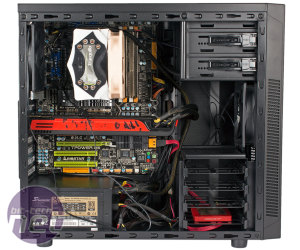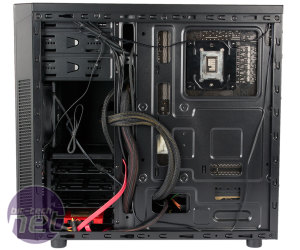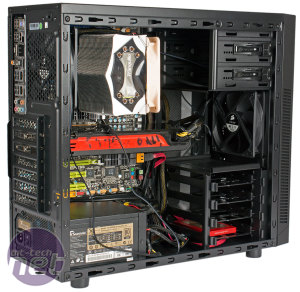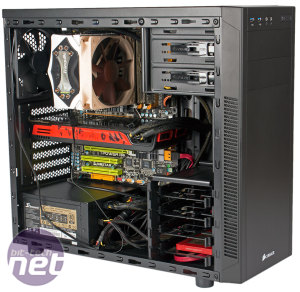
Performance Analysis
At full speed, the cooling performance of the Carbide 100R Silent Edition is poor, and it only gets worse as you lower the fan speed. The best CPU delta T achieved is 61°C, which is 2°C warmer than the similar Spec-01 managed, and that case doesn't even ship with an exhaust fan. This demonstrates that having the CPU area so insulated by the side and roof panel can cause things to heat up very quickly – the Fractal Core 2300 has a very similar cooling configuration with low speed fans but a more open roof, and is 4°C better as a result. The only way a case can really combat this is by generating more airflow in the rear exhaust fan. This is of course why low noise cases typically struggle with cooling, but even so this does stand out as a poor result. That said, the case fans are certainly very quiet, and the 100R Silent Edition does a decent enough job containing noise too, though naturally not as good a job as more expensive low noise casesMeanwhile, the best GPU delta T is 55°C, and this time it's on par with the Core 2300 (both cases have a most solid front panel and a single, low speed 120mm front intake fan). To be fair, very few low noise cases do better than 50°C, but equally it's still one of the lowest results. For comparison, the similarly designed Spec-01 is 6°C better, thanks to its more porous front panel.
At medium speed, the temperatures both increase by 3°C, while minimum speed adds another 5°C to the GPU, taking it to the new worst result of 63°C, and the CPU joins the Cooltek Antiphon on minimum speed for the worst CPU result of 71°C too. Still, at full speed, the fans are so quiet that you might as well just have them on maximum speed, and definitely not below medium speed unless your rig is very low power indeed.
Conclusion
There are certainly lots of things the Carbide 100R Silent Edition does right. It takes much of what was good about the Spec-01 and the exterior is, as we're sure you'll agree, much improved. With dust filtering, dual USB 3 ports, fan control and a removable HDD cage, the 100R is well-featured. Build quality on the whole is good too, and with Corsair being Corsair the case is very easy to work with for the most part, so it does tick a lot of boxes. With two fans thrown in, it's pretty good value too.However, as has been the situation with budget cases before, the cooling is very lacklustre, and it's hard to look past that. Of course, there is the argument that a mainstream case like this is designed for mainstream hardware, and even with the lowly cooling results we'd wager that a stock speed Core i3 or Core i5 Intel processor with a half decent cooler and an Nvidia Maxwell graphics card, for example, would work without issue. There's also the low noise element to consider – the 100R certainly is pretty quiet, and you always expect some trade off with cooling when you go for low noise (at least on air). It also has to be pointed out that there really are very few cases at this price point that feature this much noise-deadening foam, and the 100R Silent Edition is certainly very quiet too, be it at full speed or minimum, where the fans are virtually inaudible.
Even with all that said though, the poor performance is still a sticking point. In fairness, low noise and budget is not a combination we've seen done successfully before. If you're really keen on reducing noise, you'll be better off saving up and investing in a case like the Fractal Design Define R5, Be Quiet! Silent Base 800 or Nanoxia Deep Silence 1, for example, as these are designed ground up for the purpose rather than being a fairly standard design outfitted with some noise dampening material. They offer both better cooling and noise suppression. Of course, they do cost more, but the point is if you're expecting decent cooling and low noise for £50, you're asking too much, as this case shows.
As such, you could opt for the 100R Silent Edition if you love the looks and are building a system with low enough demands for the cooling on offer to be of no concern, as there's little wrong elsewhere. Otherwise, for the same money, it's easy to recommend the Fractal Design Core 3300 – it lacks a fan controller but its own fans are still quiet and it offers better cooling and cable management plus a surprising number of options for water-cooling too.
-
Cooling12 / 30
-
Features17 / 20
-
Design25 / 30
-
Value18 / 20


MSI MPG Velox 100R Chassis Review
October 14 2021 | 15:04












Want to comment? Please log in.